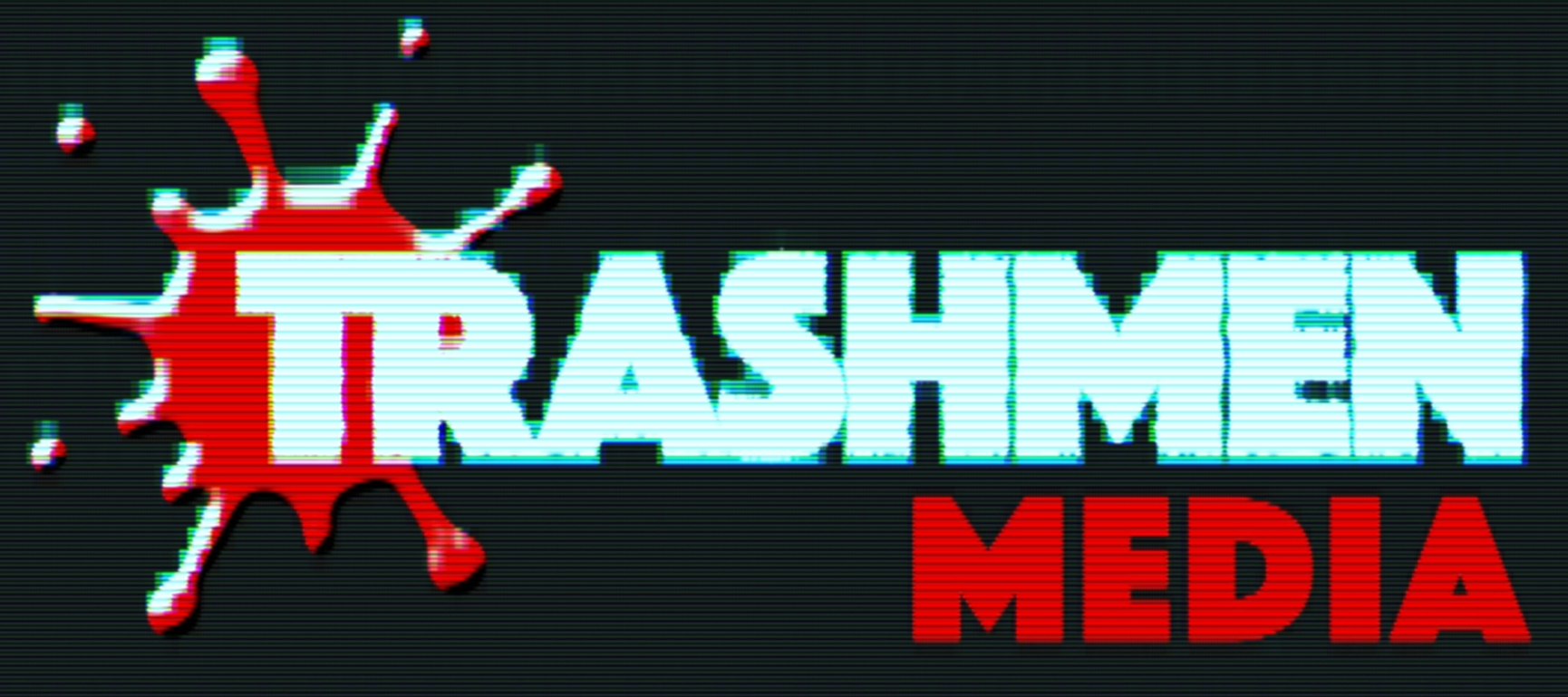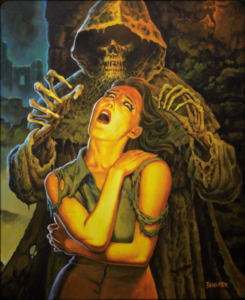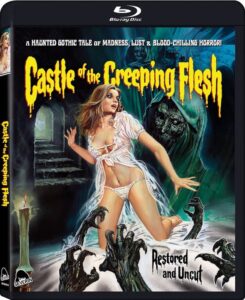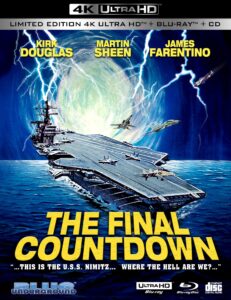Is Threads a Hidden Treasure or Dumpster Fire?
Blu-ray Distributed By: Severin Films / January 30, 2018
In September 1984, it was aired on the BBC and shocked tens of millions of UK viewers. Four months later, it was broadcast in America and became the most watched basic cable program in history. After more than three decades, it remains one of the most acclaimed and shattering made-for-television movies of all time. Reece Dinsdale (Coronation Street), David Brierly (Doctor Who) and Karen Meagher (in a stunning debut performance) star in this “graphic and haunting” (People Magazine) docudrama about the effects of a nuclear attack on the working-class city of Sheffield, England as the fabric of society unravels. Directed by Mick Jackson (THE BODYGUARD, TUESDAYS WITH MORRIE) from a screenplay by novelist/playwright Barry Hines (Ken Loach’s KES) and nominated for seven BAFTA Awards, “the most terrifying and honest portrayal of nuclear war ever filmed” (The Guardian) has now been fully restored from a 2K scan for the first time ever.
Jimbo’s Take  (4 / 5)
(4 / 5)
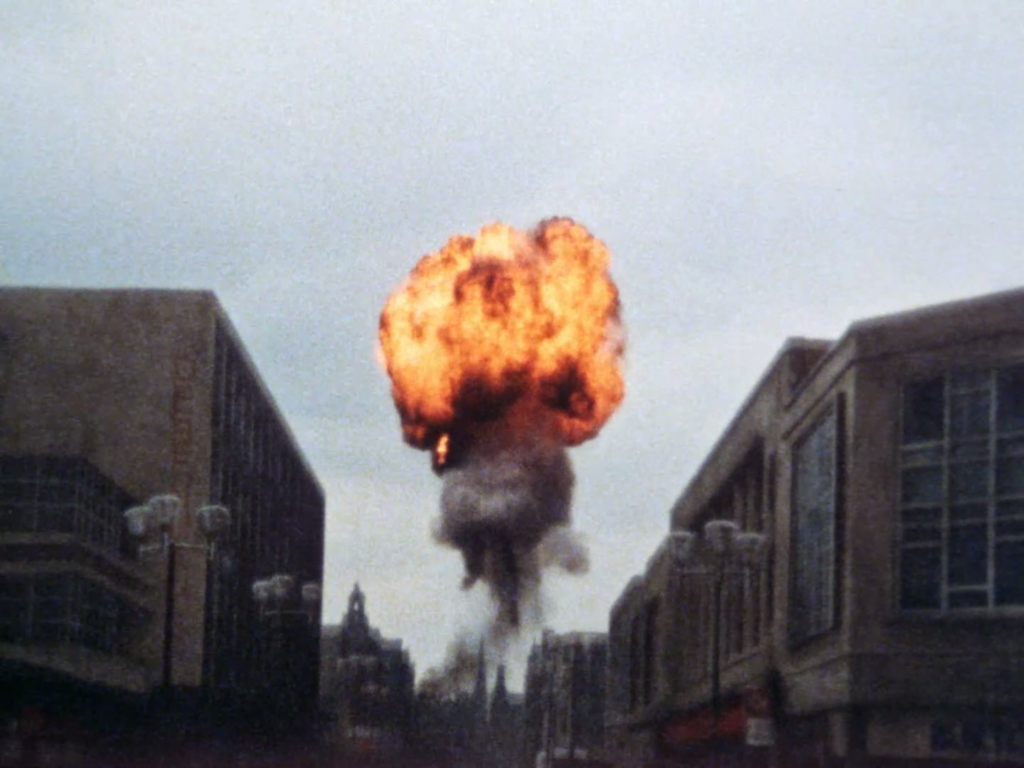 It was event television for England in 1984 when THREADS premiered on BBC2. Many of the people who watched the premiere will tell you that the experience is hard coded into memory. With Severin Films’ beautifully restored blu-ray, a new generation of viewers will have the horrors of nuclear war hardcoded into their minds.
It was event television for England in 1984 when THREADS premiered on BBC2. Many of the people who watched the premiere will tell you that the experience is hard coded into memory. With Severin Films’ beautifully restored blu-ray, a new generation of viewers will have the horrors of nuclear war hardcoded into their minds.
Most Americans may not have heard of Threads, but can more easily recall its 1983 American counterpart, The Day After, which premiered on the ABC broadcasting network. Threads is a perfect companion piece with The Day After and, in my opinion, proves to be the superior of the two.
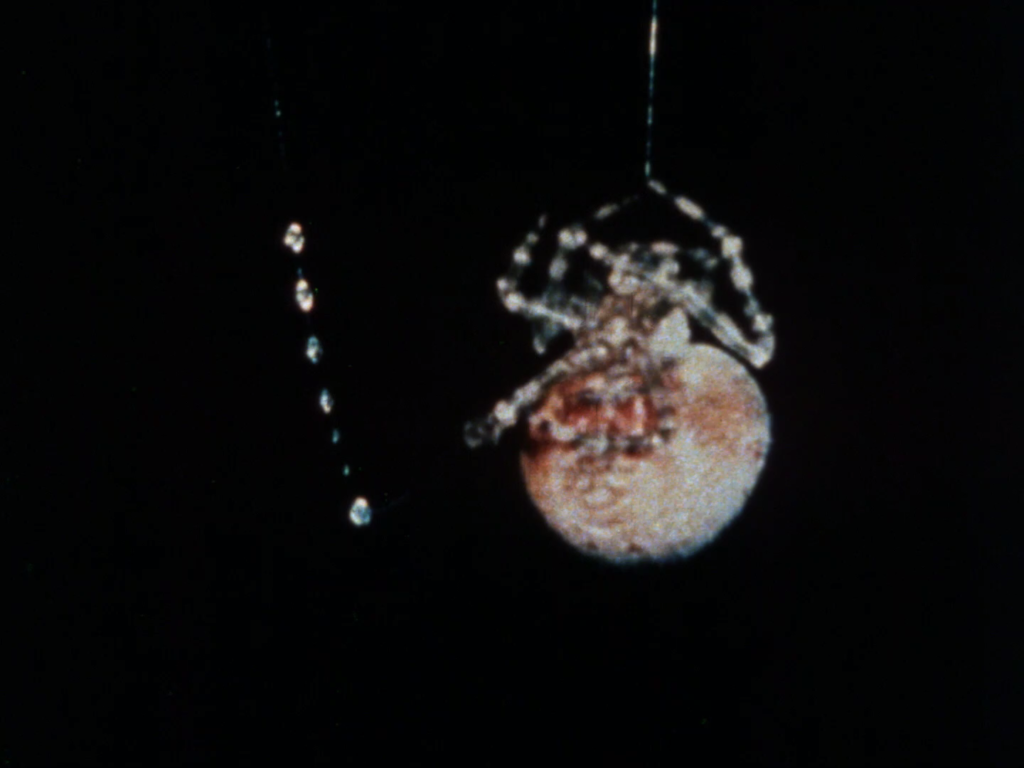 From the film’s opening frames, the filmmakers make clear why the film is titled Threads. “Threads” refer to the ties that bind humanity. The filmmakers use the image of a spider weaving a web to illustrate how all of humankind is linked, whether we realize it or not. Everyone contributes to our great society whether positively or negatively; adding to our great web, or pulling the strands to help break it apart.
From the film’s opening frames, the filmmakers make clear why the film is titled Threads. “Threads” refer to the ties that bind humanity. The filmmakers use the image of a spider weaving a web to illustrate how all of humankind is linked, whether we realize it or not. Everyone contributes to our great society whether positively or negatively; adding to our great web, or pulling the strands to help break it apart.
This is the first thing the film does exceptionally well. Like the strong fibers of a great spiders-web, the film’s script creates a perfect foundation for the film. Structured nearly to perfection, the first hour of this documentary-like drama establishes the small town of Sheffield, England, the characters who inhabit the town “at the ground level”, and the growing tensions between the USA and USSR, as a people witness helplessly.
 Two of Sheffield’s inhabitants are young couple Ruth and Jimmy. We experience much of the growing tensions between political superpowers through their eyes. And we intimately understand that they are merely observers, with no voice in the political circle of influence, but will be horribly affected regardless.
Two of Sheffield’s inhabitants are young couple Ruth and Jimmy. We experience much of the growing tensions between political superpowers through their eyes. And we intimately understand that they are merely observers, with no voice in the political circle of influence, but will be horribly affected regardless.
The midway point is the nuclear attack which ends nearly as quickly as it starts. The fortunate will die instantly in the blast. The remaining survivors scramble to implement futile government supported “duck and cover” tactics for protection that we know won’t work.
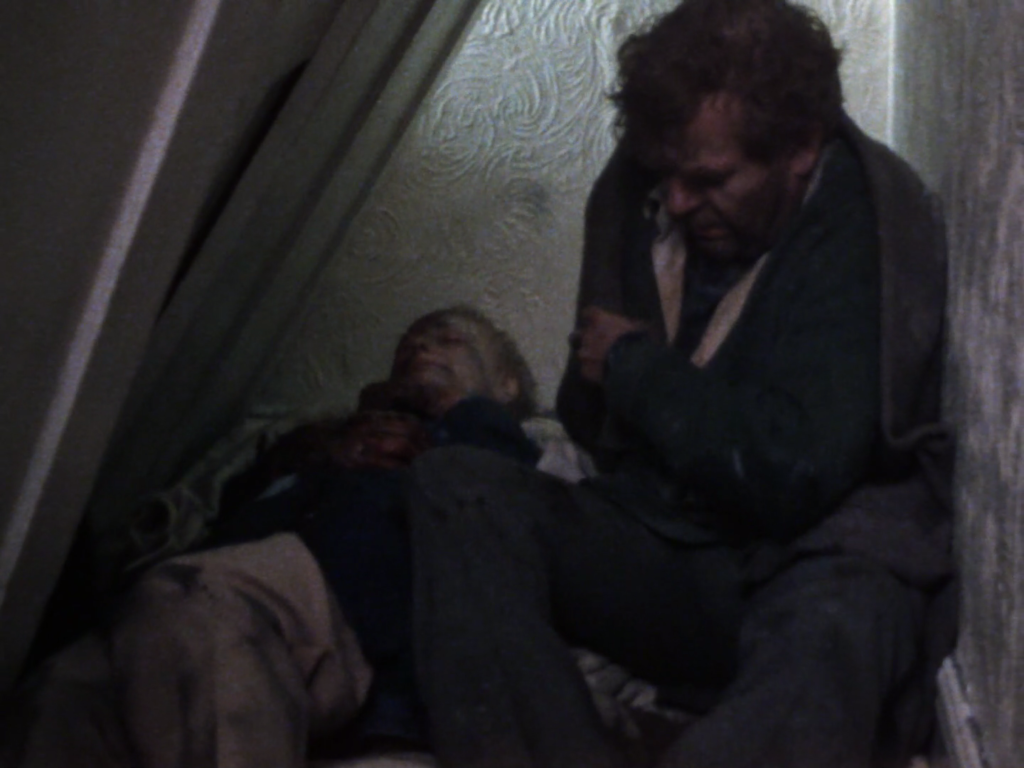 The second hour is then largely devoted to the fall-out and the very slow decline of civilization. In this hour, the filmmakers systematically work through a 13-year timespan of slow and endless decay. People die by the millions. Government agencies fail. Food becomes scarce then non-existent. People are forced to consume tainted meats and radioactive water. Annual harvests fail to produce crops. And the future generations, if they even survive birth, will most likely suffer from deformations and retardation.
The second hour is then largely devoted to the fall-out and the very slow decline of civilization. In this hour, the filmmakers systematically work through a 13-year timespan of slow and endless decay. People die by the millions. Government agencies fail. Food becomes scarce then non-existent. People are forced to consume tainted meats and radioactive water. Annual harvests fail to produce crops. And the future generations, if they even survive birth, will most likely suffer from deformations and retardation.
Threads proves exceptional by balancing a politically charged subject without being divisive. By contrast, I’ve previously reviewed another Severin release – The Killing of America – which also dealt with the politically hot topic of gun control. The Killing of America, though an important and interesting film, was politically skewed. It had an obvious left leaning agenda and many of the claims and assertions could be countered with statistical facts disproving the film’s thesis and main argument.
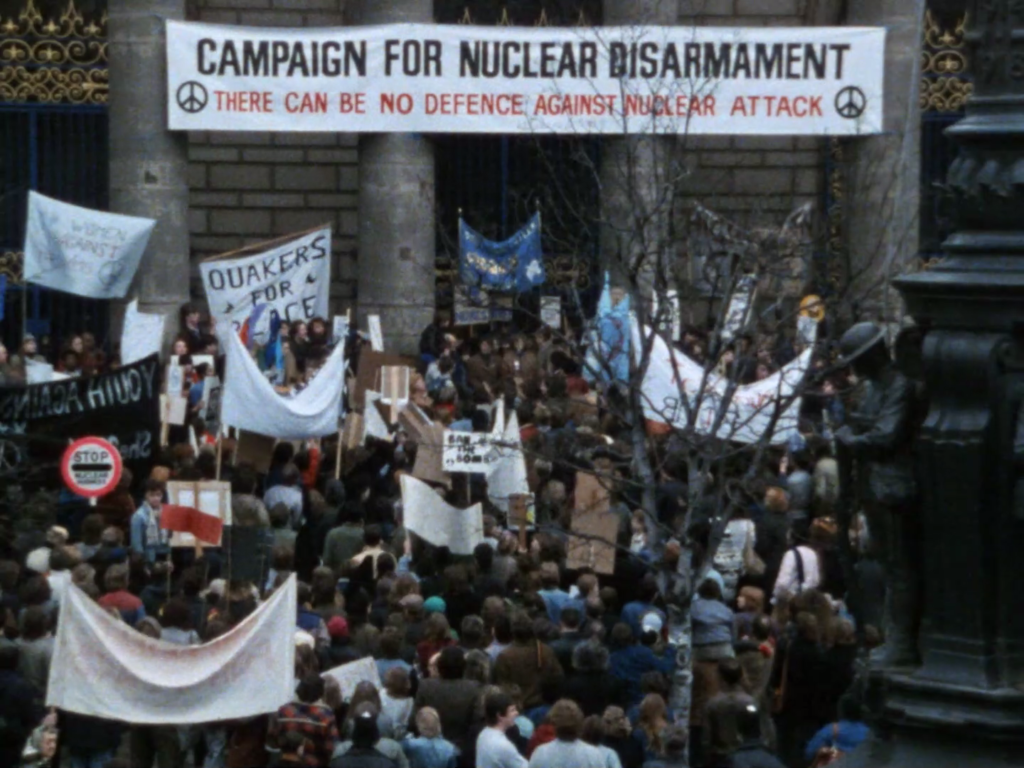 Threads, on the other hand, doesn’t outright push an agenda. Rather, it lays out facts that support the narrative. Anyone watching may disagree with how to handle the film’s central dilemma of nuclear disarmament. However, most will be hard pressed to disagree with one of the fictional activists as they shout, “You can’t win a nuclear war!” Because of this, Threads may be one of the scariest films I’ve ever seen.
Threads, on the other hand, doesn’t outright push an agenda. Rather, it lays out facts that support the narrative. Anyone watching may disagree with how to handle the film’s central dilemma of nuclear disarmament. However, most will be hard pressed to disagree with one of the fictional activists as they shout, “You can’t win a nuclear war!” Because of this, Threads may be one of the scariest films I’ve ever seen.
I know that sounds like hyperbole and a gross exaggeration. How many times have we seen “The scariest movie since The Exorcist!” plastered across movie posters? But if I can make one point abundantly clear, this movie transcends traditional horror dramas to a point I questions whether we should make a new category of horror films (Maybe something like, “Warning! Films”).
 Threads goes well beyond the shock-terror of a nuclear blast. It creates palpable anxiety with each passing frame. The filmmakers create real pressure points from the on-set. For example, our young couple, Jimmy and Ruth, learn of an unexpected pregnancy. They are forced to deal with the real life implications of this life change. Even after Jimmy uncomfortably tells his parents the news (and mum rather cavalierly offers abortion as a means to deal with the problem), the young man decides the right course of action is marriage and raising the child.
Threads goes well beyond the shock-terror of a nuclear blast. It creates palpable anxiety with each passing frame. The filmmakers create real pressure points from the on-set. For example, our young couple, Jimmy and Ruth, learn of an unexpected pregnancy. They are forced to deal with the real life implications of this life change. Even after Jimmy uncomfortably tells his parents the news (and mum rather cavalierly offers abortion as a means to deal with the problem), the young man decides the right course of action is marriage and raising the child.
This is brilliant on two fronts. At its most basic, the pregnancy gives our characters a relatable problem that makes them immediately sympathetic. This challenge is also intimate and immediate, having absolutely nothing to do with political strife taking place on opposite ends of the globe. Perhaps more importantly, it elevates our anxiety response. In the back of our minds we are also worried about the unborn child being impacted (or even deformed) by the imminent nuclear blast. And if you think the first hour elevates your anxieties and fears, the last hour will feel like an eternity of agony and despair.
 It doesn’t sound like a fun film to watch does it? Words like “fun” or “entertaining” may not apply, but the film is very much worth watching. In today’s political climate people are too concerned about their own feelings and avoid discomfort at all costs. But there are major life lessons to be found in the uncomfortable and unsettling. Threads is important because you will feel the effects of nuclear devastation. Maybe the more we share these films (even if we disagree), the more likely we avoid our own self-made destruction. So it may not be “fun” like a popcorn horror show, but it’s engaging, enlightening, necessary, and comes very highly recommended.
It doesn’t sound like a fun film to watch does it? Words like “fun” or “entertaining” may not apply, but the film is very much worth watching. In today’s political climate people are too concerned about their own feelings and avoid discomfort at all costs. But there are major life lessons to be found in the uncomfortable and unsettling. Threads is important because you will feel the effects of nuclear devastation. Maybe the more we share these films (even if we disagree), the more likely we avoid our own self-made destruction. So it may not be “fun” like a popcorn horror show, but it’s engaging, enlightening, necessary, and comes very highly recommended.
Hidden Treasure/Dumpster Fire?
| Jimbo: |  (4.0 / 5) (4.0 / 5) |
| Video/Audio: |  (3.0 / 5) (3.0 / 5) |
| Extras: |  (3.0 / 5) (3.0 / 5) |
| Average: |  (3.3 / 5) (3.3 / 5) |
[amazon_link asins=’B07885HYYG,B07885CY3Z,B079MDZD51′ template=’ProductCarousel’ store=’trashmenamaz-20′ marketplace=’US’ link_id=’32e6b4c6-2ea2-11e8-965b-21e32e6a9a27′]
Special Features
- Audio Commentary with Director Mick Jackson Moderated By Film Writer Kier-La Janisse and Severin Films’ David Gregory
- Audition For The Apocalypse: Interview With Actress Karen Meagher
- Shooting The Annihilation: Interview With Director Of Photography Andrew Dunn
- Destruction Designer: Interview With Production Designer Christopher Robilliard
- Interview With Film Writer Stephen Thrower
- US Trailer
